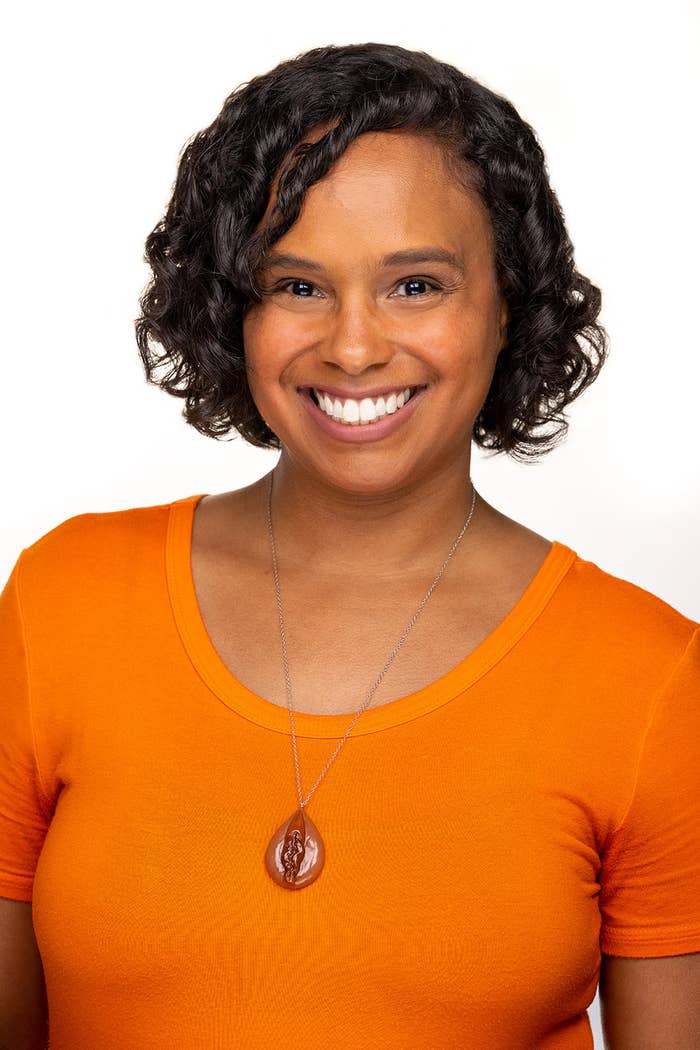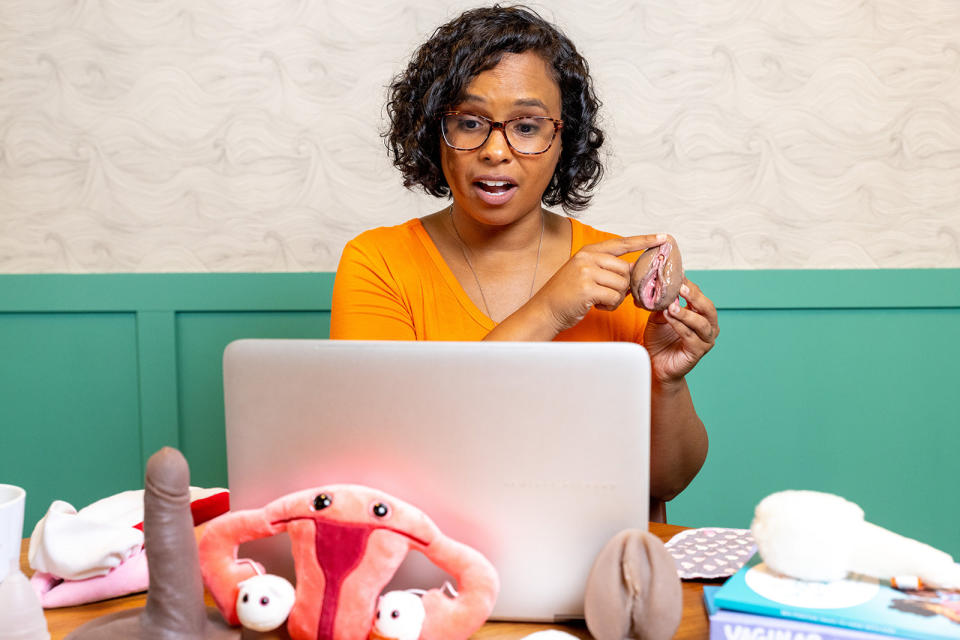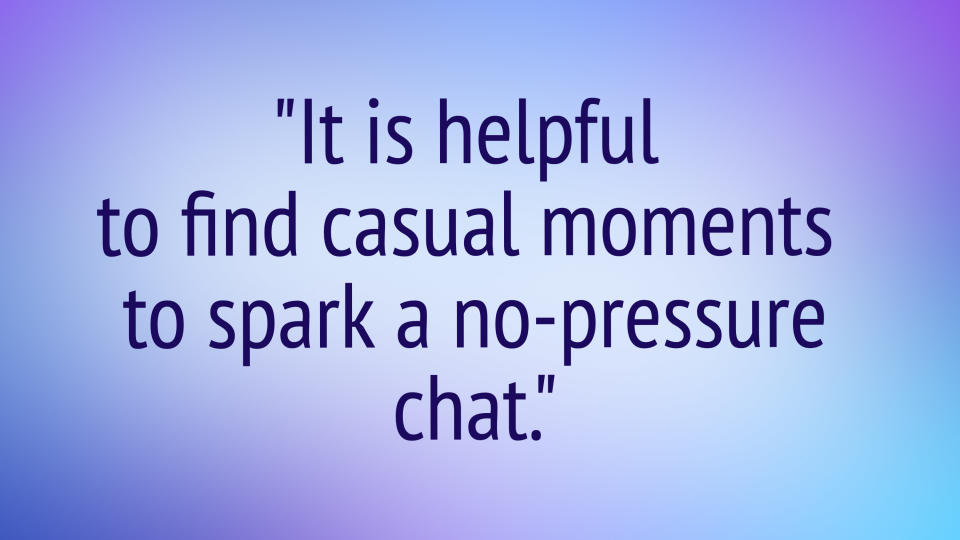What Is Sex Positive Parenting? A Primer For Parents (And Non-Parents), Directly From Experts
Sex positive parenting is being talked about more and more openly these days — and it makes sense as to why.
HannahWitton @HannahWitton / Via giphy.com
Broadly speaking, being a sex positive parent means engaging in healthy, open, and informed conversations about sex and sexuality with your child(ren).
Doing this can enpower them to grow into autonomous adults with their sexualities, and can help to reduce long-term impacts of sexism and discrimination against all genders.
Sex positive parenting is an important and complex topic — and despite not being a parent myself, I found myself wanting to know and learn more. To do that, I reached out to two experts: Melissa Pintor Carnagey (she/they) is a mother, sexuality educator, and the founder of Sex Positive Families.

She is also a Black, Puerto Rican, and Mexican licensed social worker who believes that all children deserve holistic, comprehensive, and shame-free sexuality education so they can live informed, empowered, and safer lives.
Rayka Kumru (she/they) is a sexual wellness expert with over a decade under her belt as an educator and communications consultant.

She pushes for better access to comprehensive, inclusive, age-appropriate, medically-accurate, sex-positive, and culturally respectful content and resources around the world. She has experience working internationally, especially in Canada and Turkey.
Let's start with the basics! According to the experts, here's a rundown of what exactly sex positive parenting involves...

1.Sex positive parenting is teaching that sexuality is a natural and healthy part of childhood, adolescence, and adulthood.

While gender differences have been around for hundreds of years all around the globe, the openness to discuss sexual expression, gender, and the choices presented have shifted vastly in the past several years. Sex positive parenting is a way to make space for all children to grow into their own authentic selves surrounded by unconditional love and active support.
Rayka adds that it doesn't really matter who we are, it’s about how we understand humans and the diverse ways in which they exist, regardless of whether or not we agree, want to partake, or feel like running the other way.
2.Children benefit so much from the space we can create for them to discover how they wish to express their gender and to learn what they are passionate about, free from rules about what boys, girls, or transgendered people “should” be like.

Expecting girls to be quiet and nurturing, wear pink, and love dolls while expecting boys to not cry, wear blue, and love sports are some examples of these "rules." Supporting children in figuring themselves out includes helping them to understand and become aware of the strict norms tied to their gender.
All of these help to reduce the long-term impacts of sexism and discrimination against all genders, ranging from anxiety disorders, eating disorders, depression, abuse, and declining intentions to pursue careers in specific areas, etc.
3.It's important to teach children about their bodies, the correct names of their genitals, and sexuality. This protects them against sexual abuse and also allows them to become autonomous adults who can describe any health problems they might have.
4.Children can develop the skills to communicate about sexual consent, boundaries, and desire while they are growing up with a sense of sexuality as a normal and pleasurable part of being alive.
5.Taking a balanced approach to talking about sexual health with our children means including the positive aspects of sexuality, such as the pleasure it can bring, and this can have profound impacts. This can set the stage for our children to have meaningful and pleasurable relationships of all kinds as they grow.
The Good Place @thegoodplace / Via giphy.com
Peggy Orenstein published the book Girls and Sex, which includes in-depth interviews with over 70 young women aged 15 to 25, and a wide range of experts exploring how new media, including porn and social media, profoundly impact young people’s sexuality. She found that young people rarely acknowledge the importance and value of female sexuality and pleasure and this has a deep impact on fueling an epidemic of sexual violence.
Making sure we include discussions of pleasure, intimacy, and other positive aspects of sexuality in our conversations can also be key in preventing sexual violence and harassment, which disproportionately affects girls, women, trans, and young non-binary folks.
When it comes to children, sex positivity has a lot of protective and empowering qualities, says Rayka. It teaches children that no matter what they believe in, what kind of family they come from, what they look like, what their body can and can't do, and whether or not they feel sexual or not — who they are and what they are is okay.
6.Informed kids grow into empowered and prepared adults. Open, shame-free talks and education help them get there.
7.Some children ask questions about sexuality, others don’t. Melissa says that if we’ve hushed, winced, nervously laughed, or flat-out avoided talks, our children pick up on this early and they adapt. This can create a learned discomfort.

Melissa also adds that it is helpful to find casual moments to spark a no-pressure chat, like when you’re riding in a car together, taking a walk, doing a fun activity, or as related topics come up in something you’re watching together. The more relaxed and honest you get with them, the more you’ll influence a shift in how they relate to you on these topics.
8.Our beliefs shape how we think and talk about things and they inform how we treat others. One of the most common questions Rayka gets from parents is: “What do I need to know in order to talk with my kids about sexual health and their bodies?”

Some of the things parents and caregivers can do to explore their values is ask themselves questions such as:
• What do I think about a specific topic about sexuality? (For example: masturbation)• What are some things I learned as a child about my body and sexuality?• How did I express myself? How did the adults in my life react?• What are some things I wish I knew growing up about my body, relationships, and sexuality?• Did I experience any consequences because I acted a certain way?• What do I want my child/a child in my life to know about their body/puberty/sexual health/relationships?
9.Rayka also reiterates that this a complex topic — one that's not meant to be black or white.
Everything's Gonna Be Okay @everythingsgonnabeokay / Via giphy.com
She says that sex-positivity is acknowledging and respecting people’s capabilities, abilities, and right to make their own decisions about their bodies, relationships, and sexuality— regardless of how we feel about them and what we choose for ourselves. Religious or not, monogamous or non-monogamous, asexual or pansexual.
Sexual taboos were created by humans so it's up to us to question, criticize, inspect, or break them down. She states that we can't say all taboos are bad or all taboos are harmful. This may be true for some of them but certainly not all of them. More important than anything for us is to break down sex-negative attitudes. When it comes to children, sex positivity has a lot of protective and empowering qualities.
Rayka doesn't think that sex positivity can be categorized as a black-and-white concept because what we know about human sexuality is constantly evolving. As it evolves, we evolve too, and therefore, our understanding of things is challenged constantly.
Nobody by default will always be sex-positive — it's a constant work in progress even for people who are in the field of human sexuality. So perhaps the only thing that is black and white when it comes to sex positivity is that no one can for sure say that they've got it figured out, or that they are 100% and forever will be sex-positive. We can be sex-positive as long as we put in the work.
10.At this point, we can think about how we can do the work. It is always an option to get expert help. If we don’t know where to start, there are many resources available to families that make the talks fun, inclusive, and less intimidating as well.

Melissa from Sex Positive Families had a bunch of recommendations. Some of her favorites to start with are the short, animated videos by amaze.org; episodes of the Six Minute Sex Ed podcast made for families to listen to together; and books like What Makes a Baby by Cory Silverberg and The Every Body Book by Rachel E. Simon, LCSW. Her best-selling book, Sex Positive Talks to Have With Kids, walks parents through how to have these conversations and teachable moments, from birth through the teen years, more confidently.
These are just a few of the many options that help take the taboo out of these talks. Parents can also search a directory of hundreds of inclusive resources by age, topic, and type anytime at the resources section of Sex Positive Families.

